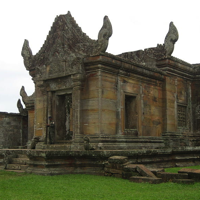A deadly clash between Thai and Cambodian troops along the border near the Preah Vihear temple has renewed long-running tension between the two Southeast Asian neighbors. The fresh conflict poses a serious threat to bilateral relations and could be exploited, especially in Thailand, in domestic leadership struggles. The dispute has also revealed the limitations of important organizations like the Association of South East Asian Nations (ASEAN).
The recent confrontation claimed the lives of three Thai and five Cambodian soldiers, and according to local NGOs forced more than 25,000 people to flee their homes amid fears of further violence. Unconfirmed reports said that there were "more than 70 killed in Cambodia," including Maj. Gen. Hun Manet, the son of Cambodian Prime Minister Hun Sen. The temple itself was seriously damaged by artillery during the exchange of fire on the border, the latest in a long series of sporadic skirmishes over the past three years.
The confrontation between the two armies along the border dates back to the summer of 2008, when the United Nations Educational, Scientific and Cultural Organization (UNESCO) designated the 11th-century Hindu temple a World Heritage site following a request from the Cambodian government.

